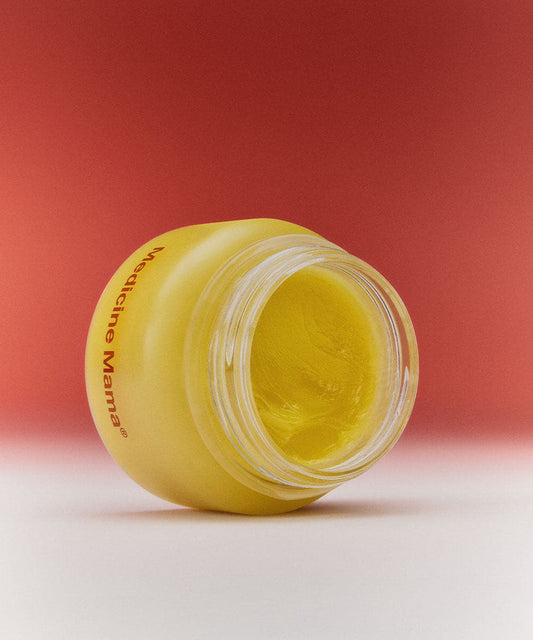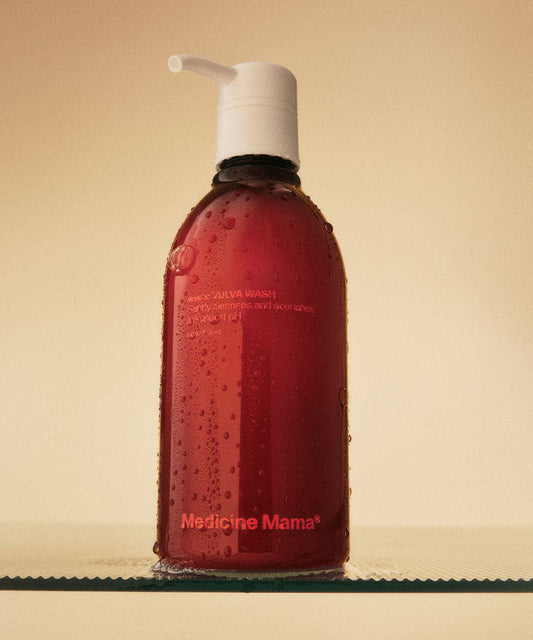Reviewed by | Dr. Clare Bertucio MD
Understanding vaginal discharge is essential for maintaining your vaginal health. This fluid is a natural and normal part of how the body keeps the vaginal area clean and healthy. By paying attention to the characteristics of your discharge, you can gain insights into what's happening in your body.
At Medicine Mama, we're dedicated to empowering women with the knowledge they need to take charge of their health. By educating ourselves about vaginal health, we can demystify topics that have been stigmatized for too long and promote open, informed conversations about our bodies.
With the right tools and information, every woman can feel confident in managing her vaginal health and seeking medical advice when necessary.
What Is Vaginal Discharge?
Vaginal discharge is a fluid produced by glands inside the vagina and cervix. This fluid carries away dead cells and bacteria, keeping the vagina clean and preventing infections.
The amount and consistency of vaginal discharge can vary throughout your menstrual cycle due to hormonal changes, and factors like age, sexual activity, and overall health influence it..
Hormonal changes due to birth control pills, pregnancy, and menopause can also affect discharge. Sexual activity can influence the amount of discharge as arousal increases vaginal lubrication. It’s important to understand these variations to distinguish between what is normal and abnormal.
What Are the Characteristics of Normal Vaginal Discharge?
Normal vaginal discharge varies in color and consistency. Typically, it ranges from clear to milky white, and its consistency can change from thin and watery to thick and sticky, depending on the time of the menstrual cycle. The odor of normal discharge is usually mild and not unpleasant.
These characteristics are influenced by hormonal fluctuations, sexual activity, and overall health. For instance, during ovulation, your discharge becomes clear and stretchy to facilitate sperm movement, while after menstruation, it might be thicker and whiter.
What Are the Types of Normal Vaginal Discharge?
Different types of vaginal discharge can indicate various stages of the menstrual cycle or health conditions. White discharge is often normal, particularly at the beginning and end of your cycle, serving as your body's natural way of keeping the vagina clean.
Clear and stretchy discharge usually indicates ovulation, marking the fertile phase of your cycle. This type of discharge helps facilitate the movement of sperm. Clear and watery discharge can occur at any time, often becoming more noticeable after exercise due to increased blood flow and sweat in the genital area.
Brown or bloody discharge is usually linked to irregular menstruation or spotting between periods. It can sometimes occur after sexual intercourse or due to hormonal fluctuations, such as those caused by birth control pills. It’s important to monitor any discharge changes and consult a healthcare provider if you notice anything unusual.
When Is Discharge Abnormal?
Abnormal vaginal discharge includes symptoms such as a strong odor, unusual color like green or gray, a thick consistency, itching, or irritation. These signs often point to underlying issues that need attention.
Bacterial vaginosis, a common bacterial infection, often causes a fishy odor and gray, frothy discharge. This condition arises when the natural balance of bacteria in the vagina is disrupted, often due to douching or using irritating products.
Yeast infections are another common cause of abnormal discharge, characterized by thick, white, cottage cheese-like discharge accompanied by severe itching and soreness. These infections occur when the balance of yeast in the vagina is disturbed, often by antibiotics or hormonal changes.
Sexually transmitted infections such as chlamydia, gonorrhea, and trichomoniasis can cause yellow or green discharge and are often associated with pain during urination, pelvic pain, or vaginal itching. These STIs require prompt medical treatment to prevent complications like pelvic inflammatory disease, which can lead to long-term reproductive health issues.
If you see any sign of infection, it’s important to speak to a healthcare professional as soon as possible — or at least get an STD panel to rule out some possible causes. As we’ve touched on, the amount of vaginal discharge you experience and the quality of it can vary, but generally, if your gut is telling you something is off, it’s worth checking out.
So, When Should You Consult a Doctor?
Certain signs require medical advice from a healthcare provider.
Odor
If you notice a persistent, strong odor, this could be a sign of bacterial vaginosis, which often presents with a fishy smell and frothy discharge. Similarly, if your discharge changes to an unusual color or consistency, such as yellow or green, it may indicate a sexually transmitted infection like chlamydia, gonorrhea, or trichomoniasis.
Itching or Soreness
Accompanying symptoms like itching, soreness, pelvic pain, or abnormal vaginal bleeding also warrant a visit to your healthcare provider. These symptoms can be associated with various conditions, from vaginal yeast infections to more serious issues like pelvic inflammatory disease or even cervical cancer.
Regular gynecological check-ups are crucial for monitoring your vaginal health and catching any potential problems early. If you experience any concerning symptoms, don't hesitate to seek medical advice!
It's always better to err on the side of caution and ensure that your vaginal health is in good standing. Your healthcare provider can help diagnose the issue and recommend appropriate treatment, whether it's a simple bacterial infection or a more complex condition.
What Can You Do To Promote Vaginal and Vulvar Well-Being?
Proper vulva care is crucial for maintaining healthy discharge and preventing infections. Daily hygiene practices play a significant role in this. If you’re worried about unusual vaginal discharge, you might think that cleaning your private area more thoroughly can help with odor and itch.
Maybe you’ve even googled it and come across the idea of douching or using a scented spray or cleanser to find relief. However, this isn’t always the best idea (if ever).
1. Avoid Scented Products and Never Douche
Douching is a potentially dangerous practice that can exacerbate many causes of abnormal vaginal discharge or even cause things like BV and yeast infections. Avoiding douching and scented sprays, bubble baths, or cleansers is important as these can disrupt the natural balance of bacteria and lead to infections.
Instead, clean your vulva with warm water and a gentle, fragrance-free feminine wash. Look for formulas that help support the natural pH balance and soothe irritation.
2. Wear Breathable, Dry Clothing
Tight clothing made from synthetic materials can irritate your vulva area and even promote infection due to rubbing and a tendency to hold onto moisture.
Because vaginal discharge is a normal thing that generally happens to everyone every day, wearing the wrong underwear or tight pants that prevent your underwear from drying can create an environment that’s hospitable for various infections.
Wearing breathable underwear, preferably cotton, helps allow air circulation and prevents moisture buildup, which can otherwise create a breeding ground for bacteria and yeast. If you’re experiencing dry skin or similar issues that may be messing with your body’s balance, a similarly gentle moisturizer can help.
3. Moisturize Your Vulva
When it comes to caring for the health of your vulva, a gentle, hormone-free vaginal moisturizer can play an essential role in easing dryness and irritation and supporting overall health. During periods of your cycle that lean toward dryness and a lack of lubrication, gentle moisturizers can support comfort during everyday activities and sex.
Formulated specifically for sensitive skin, these moisturizers are typically safe for daily use. They help nourish and reinforce the skin’s natural barrier, promoting softness and resilience while reducing discomfort.
4. Practice Safe Sex
In addition to the fact that there are some sexually transmitted diseases that can cause abnormal discharge, practicing safe sex can also help you maintain an ideal pH balance. Taking simple precautions like using physical prophylactics like condoms and dental dams can prevent your partner’s normal bacteria from throwing off your vagina’s delicate microbiome.
5. Improve Your Period Habits
We get it — periods can be a pain, literally. And they can strike unexpectedly, leaving you in less-than-ideal situations where you’re underprepared.
Because of this, it’s easy to leave tampons in slightly longer than you intend or resort to the classic toilet paper pad move to stay clean. However, proper period care can help to preserve your pH balance.
Make sure you’re changing tampons and pads regularly, and if you use a menstrual cup, make sure you’re following all instructions when it comes to keeping it clean and hygienic.
Navigating Your Well-Being With Confidence
Understanding and monitoring vaginal discharge is key to maintaining your vaginal health. You can better manage your well-being by recognizing the signs of normal and abnormal discharge.
Discharge, especially if it has an odor or is causing itching and discomfort, can feel embarrassing. But it’s completely normal, and many conditions that lead to abnormal discharge are super common and treatable.
Don’t hesitate to speak to your doctor or gynecologist if you have concerns or want an STI test, especially if you’ve had multiple sexual partners recently. There’s nothing to worry about or be embarrassed by — the faster you handle abnormal discharge, the more quickly you can get back to feeling like your most comfortable, confident self.
Disclaimer: The information provided on this blog is for general informational and educational purposes only. All content, including text, images, graphics, and other material, is not intended to be a substitute for professional medical advice, diagnosis, or treatment.
Always seek the guidance of your physician or other qualified health professional with any questions you may have regarding a medical condition, treatment, or wellness program. Never disregard the advice of a medical professional or delay in seeking it because of something you have read on this website.
Sources:
Tight Pants and Pubic-Hair Removal Increase Risk of Vulvodynia | BU School of Health
Vaginal Discharge | National Library of Medicine
Vaginal Discharge | NHS Inform
Vaginal Itching and Discharge - Adult and Adolescent | MedlinePlus



